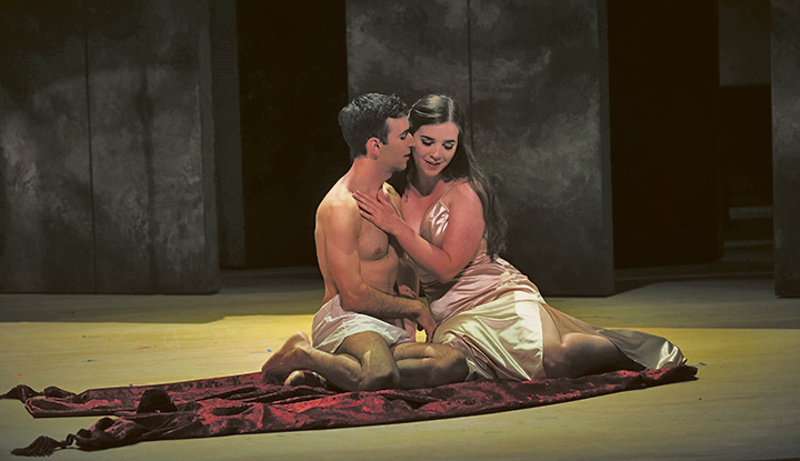CRITIC'S PICK
Political intrigue, unabated sexual passion, megalomania. This isn’t Game of Thrones; it’s Claudio Monteverdi’s 1643 Baroque opera The Coronation of Poppea, as presented by the Cincinnati Opera with a superb cast of young singers.
Poppea is based on the woman who became the infamous Roman Emperor Nero’s second wife through a series of political maneuvers and marriages. Director Zack Winokur and his production team made wise decisions to create a Classical look for the minimalist set and costumes. It is sung in Italian with projected English translation.
The School for Creative and Performing Arts’ Corbett Theater is an ideal performance space for Baroque opera; every voice is powerfully served by the hall’s intimacy and terrific acoustics. There is one remaining performance this Sunday (July 1) at 3 p.m.
Everyone in the cast is under 40, many making their Cincinnati Opera debuts. And there are three outstanding countertenors. Star countertenor Anthony Roth Costanzo created a frightening and compelling Nero. He caressed notes and phrases with an exquisite attention that was never pretentious. He was forceful when Nero erupted in maniacal fury, hurling out vocal runs and high notes as breathtaking as they were chilling. His lithe presence and catlike grace endowed Nero with even more menace.
Playing Poppea’s spurned lover Ottone, 24-year-old countertenor phenom Aryeh Nussbaum Cohen sang and moved with the assurance of a veteran performer. The character’s frustration and anger were palpable in Cohen’s purity of tone and dramatic expression.
As the scheming Poppea, soprano Sarah Shafer matched Costanzo for lyric elegance and steely determination. As the love scenes morphed from tender intimacy to calculating cruelty, Shafer navigated the vocal demands with ease. The final duet with Nero was absolutely gorgeous.
Bass Alex Rosen brought a gorgeous resonance to the role of Seneca, Nero’s tutor and the lone voice of reason. Rosen’s performance seethed with Seneca’s righteous anger, his pitch-perfect low notes articulating the sense of loss.
Mezzo Rebecca Ringle Kamarei should be singing major roles. Her lustrous tone and extraordinary range elevated the role of Arnalta, Poppea’s companion, into a memorable performance, especially of the lullaby “Oblivion Soave.” It was sung just as one would sing a lullaby: softly, almost hushed, but without a loss of sweetness or accuracy.
Mezzo Sarah Mesko brought tragic depth to Nero’s long-suffering first wife Ottavia, and soprano Melissa Harvey was a sweet-voiced Drusilla, the serving maid who falls in love with Ottone. Countertenor Daniel Moody in two roles as a valet and Seneca’s friend brought a gravitas to both. Tenor Andrew Owens and bass-baritone Christian Pursell navigated multiple roles with consummate skill.
In the pre-performance talk, the opera’s Artistic Director Evans Mirageas noted that performing a Baroque opera presents a unique challenge for the orchestra because only a melodic line is written and there are few, if any, hints of orchestration. Instrumentalists must create the score.
Under the leadership of Gary Thor Wedow, members of the Cincinnati Symphony Orchestra and the Early Music ensemble Catacoustic Consort provided a full, enchanting realization of Monteverdi’s music.
Winokur’s staging was seamless, enhanced by three set pieces and minimal props. Winokur is also a choreographer, and he made great use of his cast’s movement skills. They were never clumsy or false. I was delighted to see that Winokur allowed the music to lead the action, creating performances that were frequently riveting. There was one gratuitous move at the opera’s end that didn’t work, unless Winokur was going for a Psycho conclusion. Although jarring, it was the only false note. Overall, this was a performance of a timeless work by a cast you’re likely to see and hear more of in the future.
The Coronation of Poppea will be performed at the School for Creative and Performing Arts, Over-the-Rhine, Sunday (July 1) at 3 pm. Tickets: cincinnatiopera.org


